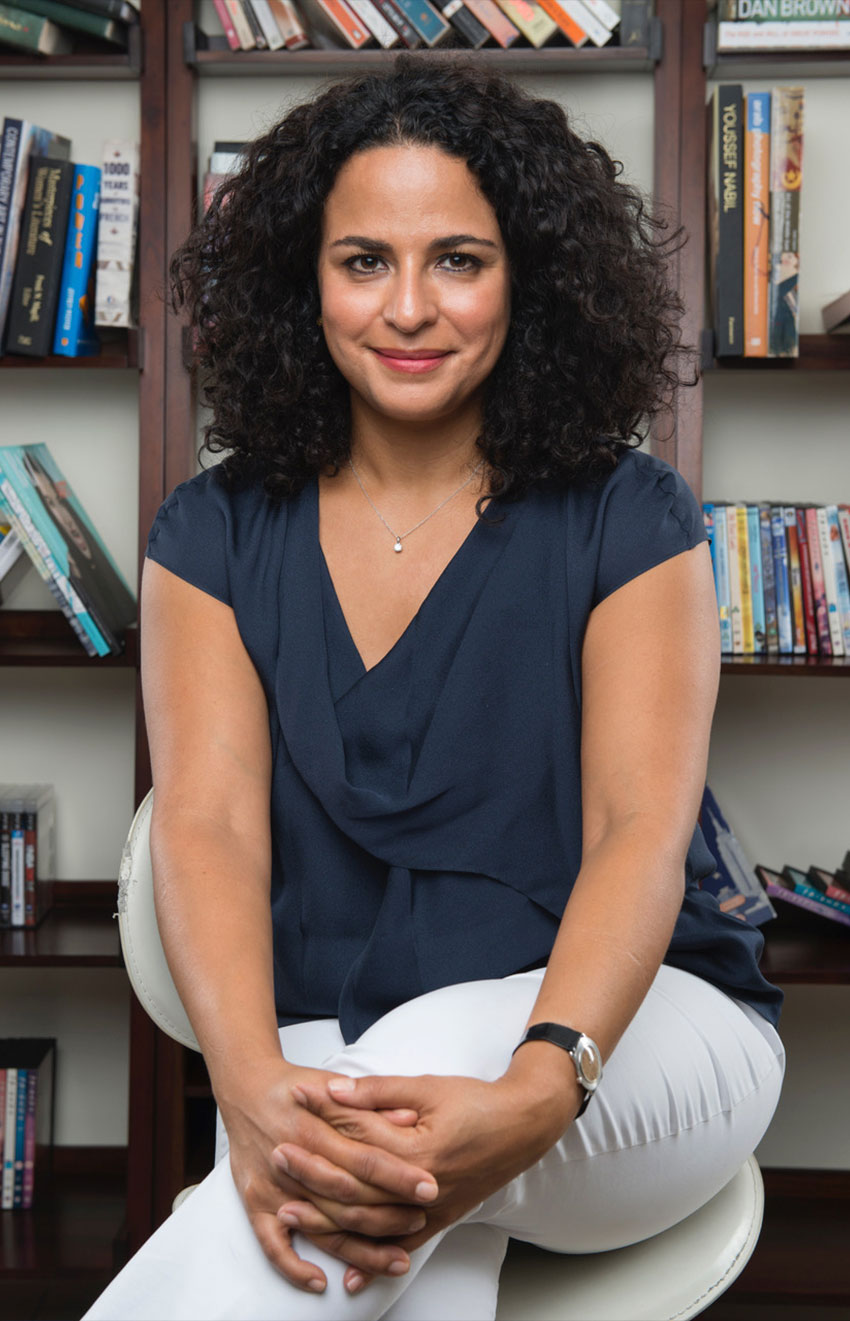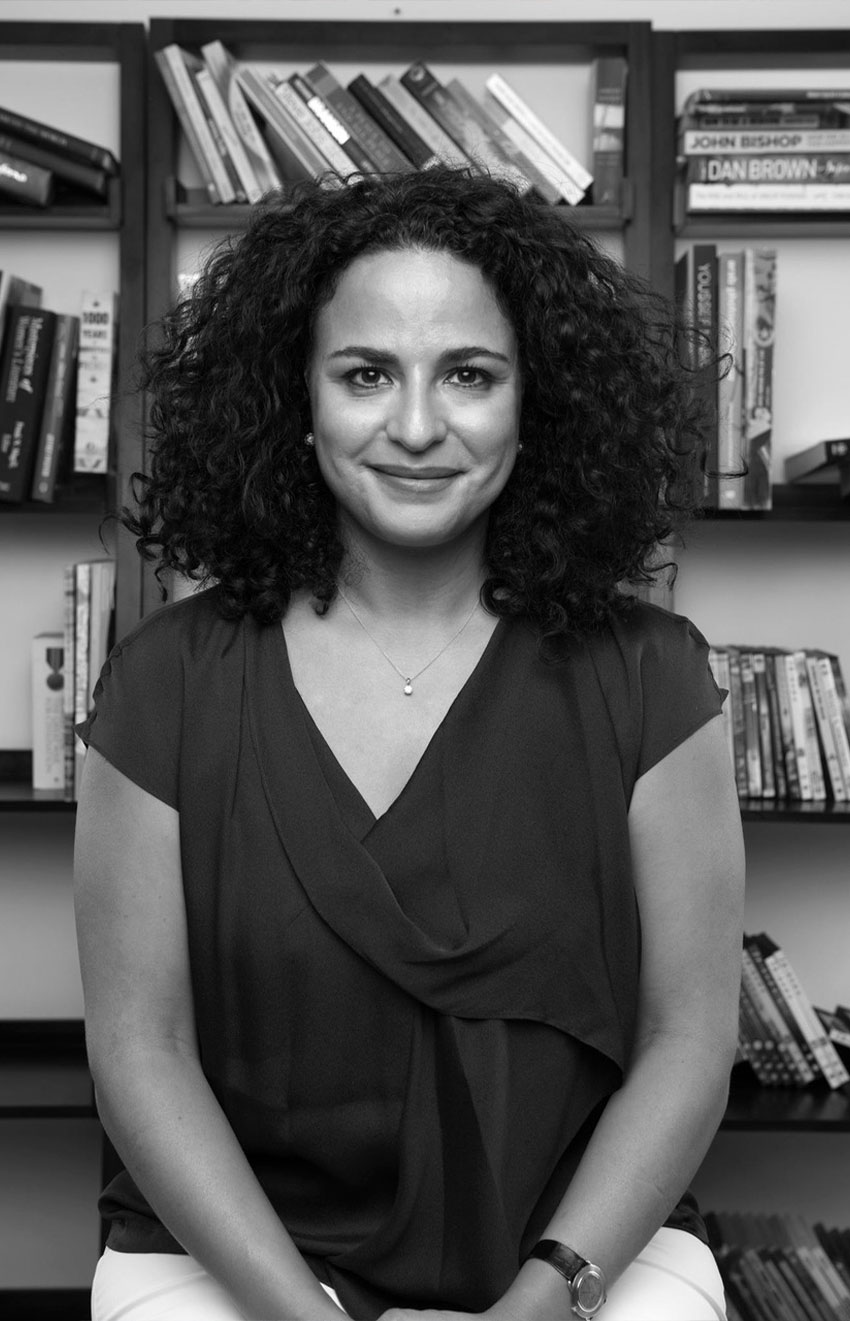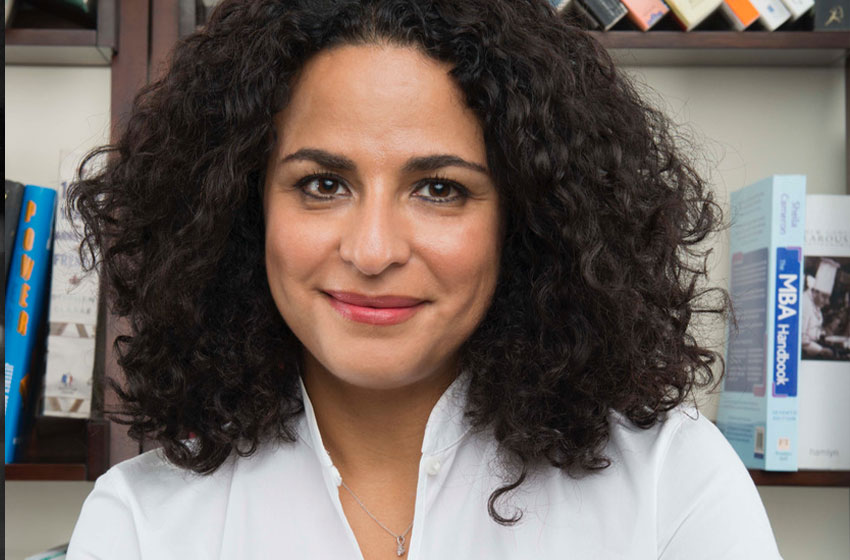Nadia Wassef
The co-founder of Diwan bookstores, Nadia Wassef
isn’t just one of Egypt’s most loved entrepreneurs, who provided Egyptian citizens the chance to delve into the renowned bookstore’s culturally vast literature collection of rare books as well as best-selling novels around the world; she’s a voracious reader herself who has dedicated her life to vindicate women’s rights and reify equality through the power of her words. We got to speak to the intellectual scholar, and she’s told us about her journey to cultural competence and entrepreneurship.
By: Mayar El-Shamy
You’re widely known as the co-founder of Diwan Bookstores. Tell us about yourself and how Diwan happened.
Diwan was simply a case of positive coincidences overlapping in different spheres. More simply put: the right people at the right time in the right place! It was in Cairo in 16 years ago that Hind, my sister and partner, and I met with a group of friends. We were all at a crossroads in our lives, questioning careers, and rethinking hopes and dreams. Cairo was ready for the change we wanted. There was growing interest in culture, its production and consumption, and we capitalized on what we saw happening around us, and became a part of it. We were avid readers who had come to realize that we couldn’t find a space that celebrated books, their writers, and their readers. So we decided to create the space that would break down the boundaries of east and west and showcase forms of cultural output: music, film, and the written word. Sixteen years ago, Hind Wassef, Nihal Schawky, and I, have tried to give our country our best. We worked hard, fought, laughed, and struggled to give birth to Diwan, grow it, and protect it through some very challenging times.

What sparked your passion in reading?
As a child, I had difficulty fitting in with the world around me. Books were a welcome escape: they took me into other worlds, they freed my imagination, and they taught me to love this world with all its goodness and disappointments. Reading showed me how to challenge everything I know, and instilled in me the belief that we create the realities we want to live. Fiction is just as valuable as fact, if not more so. Ultimately, reading is how you liberate your mind and yourself. Your words are the most powerful thing you will ever possess in your life. Use them wisely.
Tell us about Daughters of the Nile.
Daughters of the Nile: Egyptian Women’s Movements, 1900-1960, is a labour of love that my sister, Hind, and I, worked on for many years and was finally published 16 years back by the American University in Cairo Press. It is a photographic collection of women in Egypt trying to change their world by pioneering in different fields, lobbying for their rights and the rights of others, and being role models for future generations. It is also a tribute to the past, a record of this country’s rich culture, and a nudge to the future. What I find especially powerful in this book is that all the pictures collected for it either came through word of mouth, or from old magazines that littered the pavements, or hidden in warehouses of the old ezbekiya used book market. This endeavour was an attempt at saving a visual history that may well have gotten lost because no one stopped to record it.
Your work history shows great interest in women’s empowerment. How do you envision the future of Arab women?
I envision the future of Arab women to be similar to that of Arab men, and the Arab world: pretty dismal unless we stop, think, and do something about it. We need to become familiar with our past, where we have been, to actually have a plan for where we hope to be. One of our main problems as a region and as individuals is that we are in a constant disconnect with that past. People who don’t know their past will never be able to understand their present, and will always be at the mercy of whatever the future brings. This applies to us each as individuals, made up of layers of experiences and dreams, facts and fictions—we need to reconcile them and move forward. Efforts to improve women—and men’s—lot in life have always existed. Today we need to harness the past in service to the future. We need to be consistent and small goal-oriented. We have to forge alliances, set small, achievable goals, and take responsibility for our triumphs and failures.
How have Women’s Studies changed your perspective?
Gender is one of the many lenses I see the world through. It is not the only one, because that would cause a kind of myopia to how I choose to understand that world. We should also look at the world around us through the lenses of class, power, ethnicity, and sexuality. I read Simone De Beauvoir in my teens and she had a profound impact on my way of thinking. And her words, more than fifty years later, never cease to amaze me in how relevant they are: “one is not born, but rather, becomes a woman.” The same applies to men. We put different forms of constraints and pressures on men and women in an effort to mold them into something that patriarchal power structures can accept and manipulate. The basic awareness of this is the first step to changing it.
What kind of obstacles did you have to face in the process of founding Diwan?
When Time Magazine called Hind and I “unlikely entrepreneurs” in an article on Diwan six years ago, they summed it up beautifully. We had no business background, no awareness of the need for budgets, warehousing, finances… we were just armed with a passion and a commitment towards what we wanted to do. We were also happy to try, make mistakes, and try again.
The main obstacles we faced had to do with the fact that there was no blue print for what we were trying to do. On the level of IT: at the time there was no software that could accept both Arabic and English titles of books. Without it we would be unable to track sales and stock levels. Most importantly, we would be denied the privilege of learning from our customers. We had to try and create something that would work for us. We went through three types of software until we found one that suited our needs. In terms of staffing the bookstore, it was always a difficult balance to strike. People who had degrees in literature, or knew how to manage a library often had a very different set of expectation of how a commercial bookstore should be run. In the end, we settled on people with a positive outlook and a pleasant disposition that we could train.
The other obstacles lay in the fact that laws and regulations are not always very clear, so you spend a lot of time trying to navigate through the chaos, rather than focus on your business.
Has your gender ever been an obstacle for you in Egypt (or elsewhere)?
Never. That is my choice. I refuse to be cast in the role of a victim in any aspect of my life. I create my own reality and I choose to empower myself and those around me. Books are integral to that empowerment. Words are the best weapons we can ever have.
What makes Diwan different?
Diwan is a labour of love that came from the heart. It had a sincerity about it that spoke to our clients very clearly and that would explain the loyalty and attachment that people feel for Diwan to this day.
What kind of sexism do you see in Egypt, and how can we eliminate it?
I think a more precise question is “what form of sexism DO YOU NOT see in Egypt?” My answer: none. All forms of sexism are rampant and unacceptable. Women today head approximately 40% of households in Egypt—and that’s government statistics, so we are not exaggerating the figures. Yet, they are not adequately represented in politics, in unions, nor are they treated as equal citizens in the wages they earn, or before the law. The personal status laws in Egypt are offensive to women and are ridiculously unfair on all fronts. Women do not feel comfortable walking in the street in their own country, let alone taking public transportation. When families have multiple children and need to allocate resources, the needs of the boy always trump those of the girl. Illiteracy levels are higher among women. I could go on and on.
How do we change it? We work on all levels consistently: Health, education, the law, and above all, we have to work with men.
Do you consider yourself a feminist? Tell us more about your philosophies.
Absolutely. I can’t imagine that any sane human being wouldn’t be a feminist, whether they are a man or a woman.

Do you have any goals you have yet to achieve?
Too many to mention! I always have goals, and once I am close to achieving one of them, I move on to the next. Humans are the sum of their aspirations: if we stop dreaming, we die. I am always mindful of not feeling that I have reached my goal. Once you feel you have arrived at your destination you tend to get lazy and that is when failure and lethargy set in. I always feel the need to be outside of my comfort zone, to always be struggling, and striving for something. That is how our best selves are born and continue to reincarnate. Today, I am in the process of doing my third Masters Degree. My first was in English & Comparative Literature (American University in Cairo), my second was in Social Anthropology (School of Oriental and African Studies, University of London), and this one is in Creative Writing (Birkbeck, University of London). I have to confess that I find this one the hardest. Writing fiction and nonfiction is a very revealing art and it is one that forces you to rethink your life, and your world, to better understand it, reformulate it, and share it with others. That is a daunting and humbling task. It also doesn’t help that I am 43 years old, struggle with my ability to focus, and I am a mother of two very challenging young women: Zein (twelve) and Layla (eleven). They keep me on my toes and force me to always try to do better and be better.
A word of advice for our readers…
Work harder than you every imagined possible. Do it with sincerity and integrity. Don’t be afraid of making mistakes: they are your best teachers and bring you closer to your successes. Be harder on yourself than your critics, and always listen to them. Aim higher: you are too good to be mediocre.

